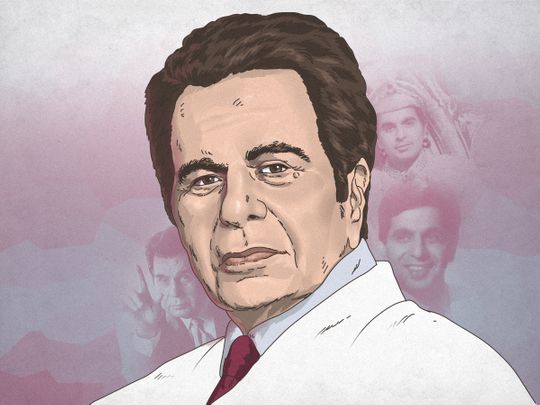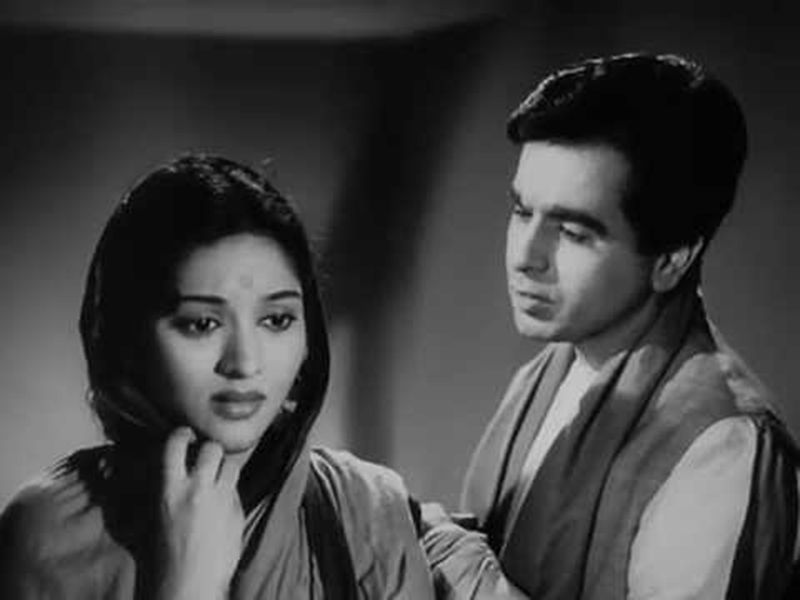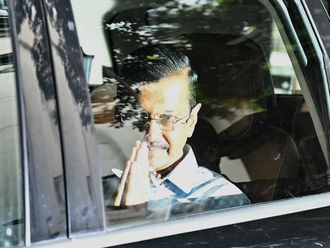
Dilip Kumar was laid to rest at Mumbai’s Juhu graveyard on Wednesday. Another year and a half and he’d have been a centenarian, but death, as we know, keeps no calendar.
Kumar’s entry into the world of cinema was as phantasmagorical as his rise to superstardom after some initial hiccups. When the glamorous actor-producer Devika Rani offered him a job in her production house as an actor, he was reluctant but agreed only after Rani quoted a monthly salary of Rs1250, which was a fortune back in the day.
He had inhibitions also because his strict father was dismissive of cinema and would never have wanted him to become an actor. It’s because of this reason that Rani had to rechristen him as Dilip Kumar from his original name Yusuf Khan.
After a couple of shaky initial performances including the disastrous 1944 debut movie Jwar Bhata, Kumar found his histrionic idiom and never looked back, scripting one iconic performance after another.
He rounded off the formative forties with a power-packed performance in Mehboob Khan’s Andaz (1949) that also featured his childhood friend Raj Kapoor and the leading lady of the day, Nargis.
With Dev Anand, Kapoor and Kumar formed the formidable trinity on which the Indian cinema rested through the fifties and the sixties. While Kapoor and Anand reigned equally supreme at the box office giving flurry of hits, Kumar stood out for the depth of his craft and the selection of films.
Come 1950 and Kumar, still in his twenties, had seasoned into a mature performer adored by masses and classes alike. But his best was yet to come. Fifties was the decade that would register him as a colossus towering over his contemporaries and those who came before and after him.
1950 was also a landmark in the world of cinema as it saw the introduction of Marlon Brado with the release of The Men, a film that failed commercially but earned praise from the critics. It also won Brando much acclaim. While Kumar was an absolute novice and a reluctant actor when he accepted Rani’s offer, Brando was an actor by choice and had learnt the ropes at Broadway theatre before venturing into Hollywood.
He had done plays and had also appeared in the 1949 TV series Actors Studio. Kumar had no such privilege before embarking on his screen journey. But he more than made up for it through sheer handwork, observation, application and brilliance of mind. Kumar gorged himself on Hollywood movies. James Stewart and Ingrid Bergman inspired him profoundly.
Both the thespians epitomised the art of method acting. While Dilip Kumar earned ‘the ultimate method actor’ epithet from the globally acclaimed director Satyajit Ray, Brando was billed as Hollywood’s poster boy of method acting, a tag he wasn’t too fond of, though.
Kumar’s versatility prompted filmmaker V Shantaram to pronounce: “Had Shakespeare met Dilip Kumar, he would have added one more character to the already well-defined ones he had created.”
It wasn’t just his understated body language and the depth in his eyes but his impactful and impeccably measured dialogue delivery that mesmerised the audience and continues to do so to this day. When he is playing a withdrawn character, he lets his eyes and pauses between words and sentences speak and when the character demands passion and aggression, his vocals can explode.
Two contrasting cases in point here can be two spectacular scenes from Andaz and Mashaal (1984). In the Andaz scene, when Nargis introduces him to Raj Kapoor, he hardly says a word but the hate and displeasure of a jealous lover is unmistakably portrayed through his eyes.
In the Mashaal scene, he brings alive the helplessness and pain through his power-packed voice as he watches his wife die before his eyes. Very few actors could bring to the fore the intensity that the scene demands.
So involved was he in his pathos-ridden characters that earned him the sobriquet of ‘tragedy king’ that, on the advice of a psychologist, he had to periodically switch over to light comic roles that he rendered with equal ease as is evident in movies like Azad, Kohinoor and Leader.

It took him six months to train as a sitarist just to give a few perfect shots in Kohinoor.
There must have been a very special coordination between his brain and the organs of speech that gave his dialogues timing and impeccability, leaving the listeners spellbound. That perhaps was also the secret of his polyglottery. Kumar was fluent in Urdu, English, Hindi, Pashto, Hindko, Punjabi, Bengali and Marathi.
Kumar’s relish for languages and literature enriched his acting enormously.
He could masterfully transcend the barriers of language and dialect. That’s why he could comfortably bridge the gap between the chaste Urdu speaking Salim of Mughal-e-Azam and the rustic Ganga of Ganga Jamuna who communicates in Awadhi dialect. He played Sagina Mahato and spoke fluent Bengali that left the Bengalis in awe and admiration of him.
So gifted was he that when you listen to his duet with Lata from Musafir (1957), you feel he could easily have made a career as a singer.
No tribute to Dilip Kumar is complete without a word or two on Saira Bano — his better half, his alter ego and his doting wife. Bano, a wonderful actress herself, is a symbol of marital commitment who exemplifies what a life partner should be like.
It was this strong bond between the two that could weather the storm of Kumar’s secret marriage that was later terminated and which he refers to as lapse of judgement in his memoir. Kumar was 44 and Bano 22 when the two married in 1966.
An avid philanthropist, Kumar was also a champion of communal harmony. The way he reached out to communities to build bridges after the 93 Mumbai riots is exemplary. Whether he had to go to the suburbs of Mumbai for social service or to London to generate funds for Imran Khan’s cancer hospital, he was always ready to serve.
So charismatic and influential was he that when at the time of Kargil War in 1999, situation between India and Pakistan was tense, Prime Minister Vajpayee called Kumar over to Delhi and had him speak to Nawaz Sharif to ease the tension.
Kumar embodied the zeitgeist of an era gone by and they don’t make them like that anymore.
Shabir Hussain is a senior journalist based in India


_resources1_16a45059ca3_small.jpg)




